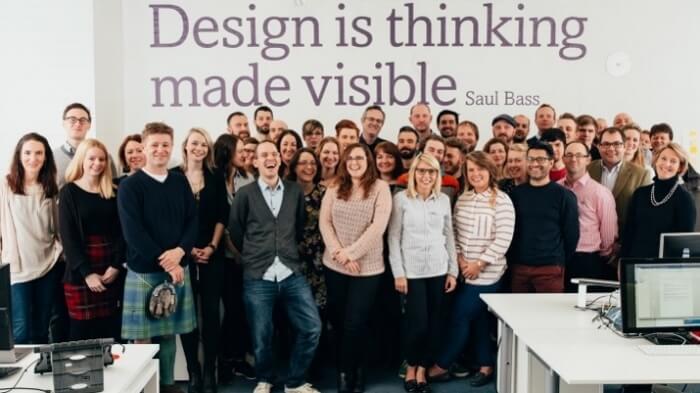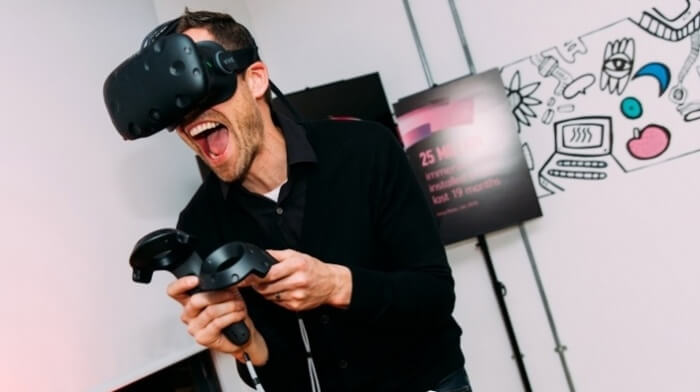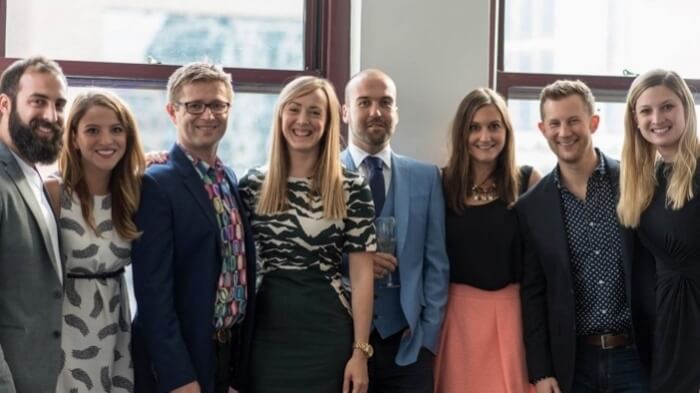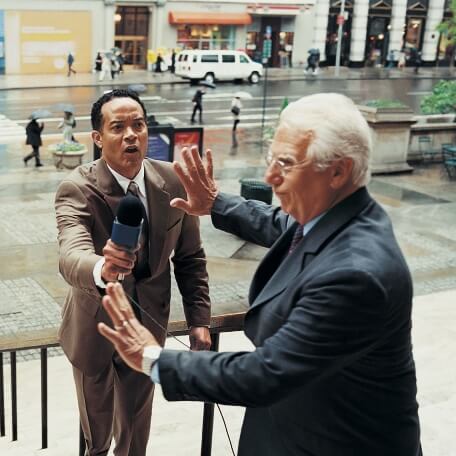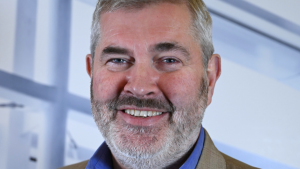We Named Our Firm After The Patron Saint Of Business
Creative marketing agency Omobono won big with its focus on business-facing clients.
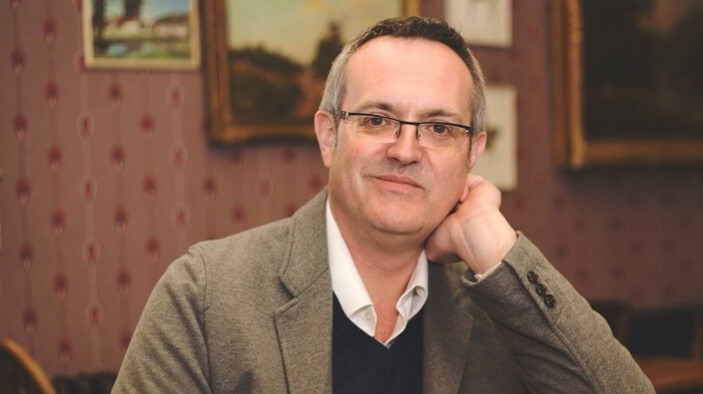
Chris Butterworth, creative director and founder of Omobono, says the bedrock of his business' growth was that b2b companies, as opposed to consumer brands, have been badly under-served by the creative industries.
Tell us about your business
Omobono is a marketing agency that’s 100% focused on business brands. We mix creative thinking and technology to help our clients communicate with their customers and employees in meaningful and memorable ways.
What was the eureka moment?
The three founders of the company — myself, Fran Brosan and Ben Dansie — all worked together previously. Ben and I were talking about setting up by ourselves but we recognised we’d be stronger if Fran was part of it too. The problem was that she was our boss at the time.
If we asked her and she said no, we were probably out of a job. In the event, we all went to a client meeting and signed in the visitor’s book. Fran looked at our surnames and said “that looks like a good name for an agency”. By the time we’d left the lift on the 5th floor, the deal was sealed. Luckily we didn’t choose to put our names over the door though.
We set up to focus on B2B. It accounts for 56% of the global economy but is woefully underserviced by agencies. We thought we could provide better ideas and service than anyone else out there. And we still do.
Where are you today?
When we started, there were four of us in Fran’s basement. We began by working with regional clients in the East of England. There are now 90+ of us in offices in London, Chicago, Cambridge and Dubai. This year we’re expecting to turnover £9+ million.
All our clients are large global corporate customers. We deliver work all over the world for them, from interactive recruitment tools in Manila to brand development projects in Dubai.
Any bumps in the road on that journey?
Probably the biggest challenge we faced as a business was the advent of digital as the predominant force in marketing. Up until 2005, we had been like most other agencies at the time – a mixture of press and print with the occasional foray into email banners.
But by the middle of the last decade it was clear that the winds of change were blowing towards digital and that ‘traditional’ agencies were going to be left behind.
Our response was to re-engineer the business. We hired digital expertise and immersed ourselves in the subject. Today 90% of our billings come from digital projects – content, sites, apps, marketing automation and pureplay technology.
We hired an excellent CTO, which was never something that I imagined we’d need when we started.
How does a marketing business market itself?
One of the best decisions we made was choosing our name. Yes, I know it’s weird but the story behind it makes it unexpected and memorable. Omobono is the patron saint of business — and as a company focused on business brands it’s an obvious connection.
Over the years we’ve done lots of Saint-related things both internally and externally, like taking the entire company to his birthplace in Italy.
Most of our business comes from referrals. We’ve made a strong network of contacts through things like our partnership with the Marketing Society in the UK and industry forums. B2B marketing requires a different approach to consumer-goods so being known as an expert in the specialism counts for everything.
What's the good and bad of running Omobono?
The challenges facing our business are no different to any other. The key one is always making sure there’s enough fuel to feed the fire. As we’ve got bigger we have a larger resource to keep busy and more mouths to feed.
But the flip side is that growth is the exciting thing. Being able to hire specialists in new disciplines to add to our armory. Being able to open new offices in different parts of the world. And having the satisfaction of seeing people grow in their roles as they embrace new challenges.
Is the UK a good place to grow a business?
The Evening Standard recently pointed out that the creative industry is the second largest sector in the UK economy. Being part of that is rewarding and allows us to interact with some of the world’s best creative companies and people.
Politically, although there is recognition of the industry at government level, I don’t think the needs of the industry (or for that matter society) are served well by the structures in place. Education particularly is aimed at spitting people out into the economy who have reached a level of academic achievement.
But what we want as an industry are critical-thinkers, entrepreneurial spirits and people who question the status quo. I don’t think there is enough focus on, or nurturing of, these qualities from an early age.
What is your biggest mistake?
Underestimating the percentage of life running a business occupies. Coming from a salaried job, I naively assumed that running a business would take up a similar amount of brain space. But I wasn’t even close and it had a knock-on effect to other areas of my life.
For anyone starting a business, I would urge them to think about it in the context of their whole life, not just their working life.
In what ways are you different from the pack?
Our point of difference is our understanding of large business brands and B2B buyers. They are global by nature, need internal alignment as well as external marketing, and involve a chain of decision-makers from a spectrum of disciplines.
We add to the canon of business thinking with a research programme called What Works Where. Every year it takes an in-depth look at a pertinent issue for B2B marketers. This year it will be investigating the relationship between marketing and HR because, for business brands, their people are a key channel to market.
Has the government been supportive?
Over the years we’ve been in business it’s been a movable feast. From the development agency quangos of the early 2000s to the introduction of R&D Tax Credits, there have been plenty of initiatives.
We’ve used UKTI to help us develop an export base and been the proud recipient of a Queen’s Award for Enterprise. So whilst it’s been a variety of support, there has always been something there to make use of.
I would say that there should be more focus on tax-breaks and support for micro-businesses and start-ups. Some will evolve into the major tax payers of future (or major tax avoiders depending on your moral stance!).
What's your advice for new start-ups?
Find a niche and stick to it – the world favours specialists. Omobono has always focused on business brands. Within that though we have done all kinds of projects but each has built on our specialism and enhanced our reputation.
Hire people that are better than you. It sounds obvious but I’ve seen people run businesses who want to remain the highest performer. It just keeps them within the boundaries of their own abilities.
The only limiting factor is your own ambition. Sounds like a cliché, but if you mix motivation, tenacity and a strong vision it can take you anywhere. And if you’re going to start something as all-consuming as a business, you may as well dream big!
Thanks for signing up to Minutehack alerts.
Brilliant editorials heading your way soon.
Okay, Thanks!
